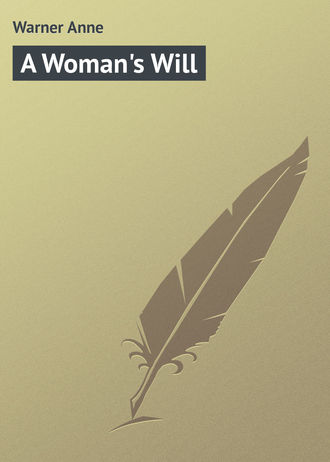 полная версия
полная версияA Woman's Will
“I asked you to go out with me,” he reminded her; “will you go? Yes? – I mean ‘No’?” he added in hasty correction.
She bent above the flowers, just to see what he would say next.
“Can you go to walk so,” he inquired, “or shall I go down and wait while you undress?”
She straightened up.
“I can go out this way,” she told him; “I have only to get my hat.”
“And you will go now?”
“Yes, with pleasure.”
“Is it long to get a hat? I will go down to wait for you, you know.”
“It is five minutes.”
“Is it really five minutes?” he asked anxiously; “or shall I be there very much longer?”
“If I say five minutes it will be five minutes.”
He took his hat and cane in his left hand and extended the other to her with a smile.
“I will go and wait,” he said.
She gave him her hand; he held it a minute, looking down into her eyes, which wavered and fell before his.
“Comme vous êtes charmante!” he exclaimed in a low voice, and, bending, pressed a kiss (a most fervent one this time) upon the fingers which he raised within his own.
After which he left the room at once.
Rosina caught a quick breath as she went in to where her maid sat mending some lace.
“Get my things, Ottillie, I am going out.”
“What a beautiful color madame has,” Ottillie remarked, as she rose hastily and went towards the wardrobe.
Rosina looked at herself in the mirror. She was forced to smile at what she saw there, for the best cosmetic in the wide world is the knowledge that the right person is waiting downstairs.
“Do hurry, Ottillie,” she said impatiently, “and get me out a pretty, a very pretty, hat; do you hear?”
And then she felt with a glorious rush of joy how more than good life is when June is fair, and one is young, and —
“Where shall we walk?” he asked, when she came down to him.
“On the Quai, of course. No one ever walks anywhere else.”
“I do often, and we did this morning,” he replied, as they passed out through the maze of tables and orange-trees that covered the terrace before the hotel.
“I should have said ‘no one who is anybody.’”
He looked at her, a sadly puzzled trouble in his eyes.
“Is it a joke you make there,” he asked, “or but your argot?”
“I don’t know,” she said, unfurling her parasol; “the question that I am putting to myself just now is, why did not you raise this for me instead of allowing me to do it for myself?”
He looked at her fixedly.
“Why should I do so? or is that a joke?”
“No, I asked that in dead earnest.”
“In dead – in dead – ” he stammered hopelessly; “oh,” he exclaimed, “perhaps it is that I am really stupid, after all.”
“No, no,” she laughed; “it is I that am behaving badly. It amuses me to tease you by using words that you do not understand.”
“But that is not very nice of you,” he said, smiling. “Why do you want to tease me?”
“I don’t know, but I do.”
He laughed lightly.
“We amuse ourselves together, n’est-ce pas?” he asked. “It is like children to laugh and not know why. I find such pleasure very pleasant. One cannot be always wise – above all, with a woman.”
“I do not want to be wise,” she said, as they joined the promenading crowd; “I much prefer to have my clothes fit well.”
Then he laughed outright.
“Vous êtes si drôle!” he said apologetically.
“Oh, I don’t mind your laughing,” she said, “but I do wish that you would walk on the other side.”
“The other side of the street?” he asked, with surprise.
“No, no; the other side of me.”
“Why should I not be on this side as well as on that?”
“Because that’s the wrong one to be on.”
“It is not! I am on the very right place.”
“No; you should be between the lady and the street.”
“Why?” he demanded, as he raised his hat to some one.
“To protect her – me.”
“To protect you how? Nothing will come up out of the lake to hurt you.” Then he raised his hat to some people that she bowed to.
“It isn’t that, it is that the outside is where the man should walk. It’s the custom. It’s his proper place.”
“No, it is not. I am proper where I am; I would be improper if I was over there.”
“In America men always walk on the outside.”
“But we are not in America, we are in Lucerne, and that is Europe, and for Europe I am right. Mon Dieu, do you think that I do not know!”
Rosina shrugged her shoulders.
“I am really distressed when we meet any Americans, because I am sure that they think that you have not been well brought up.”
Von Ibn shrugged his shoulders.
“There are not many Americans here to think anything,” he said carelessly, “and all the Europeans whom we meet know that I am well brought up whichever side I may choose to walk upon.” He bowed again to some carriage people.
She trailed her pace a little and then paused; he was such a temptation that she could not resist.
“I do wish,” she said earnestly, “that to please me you would do as I ask you, just this once!”
He stopped short and stared first at her and then at the lake.
“I wonder,” he said slowly, – “I wonder if we are to be together ever after these days?”
“Why do you wonder that? Would you rather never see me again than do something to please me?”
“No, no,” he said hastily, a little shock in his tone, “but you must understand that if we are to be much together I cannot begin with the making of my obedience to suit you. And yet, if it is but for these two days, I can very well do whatever you may wish.”
He moved out of the line so as to think maturely upon such a weighty matter. She covered her real interest in his meditations with an excellent assumption of interest in the superb view before her. The Rigi was towering there, and its crest and the crests of all its lofty neighbors were brightly silvered by the descending sun. From Pilatus on the right, away to the green banks of Weggis and Vitznau on the left, the lake spread in blue and bronze, and by the opposite shore the water’s calm was such that a ghostly Lucerne of the under-world lay upside down just beneath its level, and mocked reality above by the perfection of detail. Little bright-sailed boats danced here and there, a large steamer was gliding into the landing by the Gare, and the music from a band aboard came floating to their ears.
That little gray mother-duck who raises so many families under the shelter of the Schweizerhof Quai presently noticed these two silent people, and, suspecting them of possessing superfluous bread, came hastily paddling to the feast. It made Rosina feel badly to see the patient little creature wait there below; but she was breadless, and could only muse over the curious similarity of a woman’s lot with a hungry duck’s, until the duck gave up in despair and paddled off, leaving a possible lesson in her wake.
“Oh dear!” she exclaimed then, “I’m going to Zurich Monday, and you’re going to stay here all summer; we shall never meet again, so what is the use of thinking so long over nothing!”
Then he put his hand up, gave his moustache ends a twist, and turned to walk on. He was still on the same side, and there was a sort of emphasis about his being there which made her want to laugh, even while she recognized the fact that the under-current of the minute was a strong one – stronger perhaps than she was understanding just then.
“You don’t feel altogether positive as to your summer plans, I see?” she queried, with a little glance of fun.
“I never am positive,” he said, almost grimly. “I will never bind myself even by a thread. I must go free; no one must think to hold me.”
“I’m sure I don’t want to hold you,” she laughed; “I think you are dreadfully rude, but of course you can do what you please.”
“You find me rude?” he asked soberly.
“Yes, indeed, I think you are very rude. Here we are still on the first day of our acquaintance, and you refuse absolutely to grant me such a trifling request.”
They had continued to follow the stone dalles of the embankment and were now near the end of the Quai; he stopped short again, and again stared at the mountains.
“Ask me what you will,” he said, after a moment’s pause, “and you shall have it; but to that first most absurd asking I shall always refuse.”
Her eyes began to dance.
“If I asked you to buy me an automobile!” she ventured.
He glanced at her quickly.
“Do you ask me for an automobile?” he demanded.
Her eyes wandered towards a certain shop on the other side of the carriage way.
“If I asked you for that necklace in the window there!”
He raised his shoulders slightly.
“Ladies prefer to buy their own necklaces,” he said briefly.
She gave him a furtive look out of the corner of her eye.
“Monsieur, suppose I beg you to take me back to the hotel and henceforth never speak to me!”
He did not appear in the slightest degree alarmed. Instead he put his hand beneath her arm and turned her for another round of promenade.
“I think the automobile will be best,” he said tranquilly. “I will find you a good chauffeur, and you can go to Zurich on its wheels.”
“I only said ‘if,’ you know,” she murmured.
“Yes, I know,” he replied; “but an automobile is always useful.” He thought a moment and then added, “About how much will you choose to pay for it?”
In spite of herself she started and stared at him. He met her eyes with a smile of mockery; Its innuendo was unbearable.
“You know very well,” she burst forth impetuously, “that I would never have thought of really accepting an automobile from you!”
Then he laughed again with fresh amusement.
“Comme madame se fâche!” he cried, “it is most droll! All that I may say you will believe.”
“I find you very exasperating,” Rosina exclaimed, her cheeks becoming hotly pink; “you amuse yourself in a way that transcends politeness. I honestly think that you are very rude indeed, and I am in earnest now.”
He made a careless movement with his head.
“Would you have preferred that I should believe you really expect of me an automobile?” he asked.
“You could not possibly have thought that anyhow, and so why should you have spoken as if you were afraid lest I might have meant it?”
He rapped on a tree with his cane as he passed it.
“‘Might,’ and ‘would,’ and ‘should,’” he said placidly, “those are the hardest words for a stranger to learn correctly.”
She felt her temper slipping its anchor.
“Probably when your tutor endeavored to teach you their difference you feared that yielding to his way might be sacrificing your independence, and so you refused to consider his instruction.”
He struck another tree with his cane.
“When you talk so fast and use such great words I cannot understand at all,” he said calmly.
Then she fairly choked.
“Are you quite really angry?” he asked with curiosity. She turned her face away and kept it averted.
“Let us go into the café of the Nationale and dine,” he proposed suddenly.
“No,” she said quickly, – “no, I must go home at once. I have a dinner engagement, and I must change my dress before I go.”
“Then I shall not see you this evening?”
“No” (very bitterly); “what a pity that will be!”
“But to-morrow?”
“I am going with a party to the Gutsch.”
“But that will not be all day?”
“Perhaps.”
He hesitated in his step, and then came to a full stop.
“Let us go up this little street,” he suggested. “I was there yesterday; it is interesting really.”
She continued to walk on alone and he was obliged to rejoin her; then he glanced downward somewhat anxiously.
“We cannot speak here,” he said in a low tone, “we know so many people that come against us each minute. Do walk with me up to the church there, we cannot go to the hotel like this.”
It is true that the Quai at Lucerne has a trick of slipping away beneath one’s feet to the end that the hotel is forever springing up in one’s face. At this moment it loomed disagreeably close at hand.
“If you want to walk farther, monsieur, you will have to walk alone; I am going home.”
For answer he took her arm firmly in his and turned her across towards the church street. Well-bred people do not have scenes on the Schweizerhof Quai, so Rosina went where she was steered by the iron grip on her elbow.
The instant that they were out of the crowd his manner and voice altered materially.
“You must forgive me,” he pleaded. “I thought that you understood; I thought that we were together amused; it was against my intention to offend you.”
She stopped and looked at a window full of carved bears and lions; various expressions contended in her face, but none of them were soft or sweet.
“You pardon me, do you not?” he went on, laying his fingers upon her arm, while beneath his heavy eyelids there crept a look which his family would have regarded as too good to be true.
She shook the hand off quickly with an apprehensive glance at their surroundings.
“I ask you ten thousand pardons,” he repeated; “what can I do to make you know my feeling is true?”
She bit her lip, and then a sudden thought occurred to her. Her anger took wings at once.
“Will you walk back to the hotel on the outside,” she asked seriously, looking up into his face.
He gave a quick movement of surprise, and then made his customary pause for decision.
“How drolly odd women are,” he murmured presently, “and you are so very oddly droll!”
“But will you do it?” she repeated insistently.
He took his cane and drew a line in the dust between two of the cement blocks of the sidewalk, and then he lifted his eyes to hers with a smile so sweet and bright, so liquidly warm and winning, that it metamorphosed him for the nonce into a rarely handsome man.
Few women are proof against such smiles, or the men who can produce them at will, and the remnants of Rosina’s wrath faded completely as she saw its dawning. It seemed futile to try to be cross with any one who had such magic in his face, and so she returned the glance in kind.
“And you will walk home on the outside, will you not?” she asked, quite secure as to his answer now.
He laughed lightly and turned to continue on their way.
“Of a surety not,” he said; “but we will be from now on very sympathique, and never so foolishly dispute once more.”
At the dinner-party that evening was the young American who was engaged to the girl at Smith College.
“I saw you walking with Von Ibn this afternoon,” he said to Rosina as they chanced together during the coffee-and-cigarette period.
“Where?” she asked. “I don’t remember seeing you anywhere.”
“No; he appeared to engross you pretty thoroughly. I feel that I ought to warn you.”
“What about?”
“He isn’t a bit popular.”
“Poor man!”
“None of the men ever have anything to do with him; you never see him with any one, and it’s odd, because he talks English awfully well.”
“What do you suppose they have against him?”
“Oh, nothing in particular, I guess, only they don’t like him. He isn’t interesting to any one.”
“Oh, there I beg to differ with you,” she said quickly; “I saw him speak to some one to-day who I am sure found him very interesting indeed.”
“Who was it?”
“Myself.”
Chapter Four
“HAVE you ever thought what is love and what is passion?”
It was the man who spoke as they leaned against the rail of that afternoon steamer which is scheduled to make port at the Quai by seven o’clock, at the Gare by seven-ten.
Rosina simply shook her head.
“I am going to tell you that,” he said, turning his dark gaze down upon the shadows in the wake behind them; “we part perhaps this night, and I have a fancy to talk of just that. Perhaps it will come that we never meet again, but when you love you will think of what I have say.”
“I never shall love,” she said thoughtfully.
He did not appear to hear her at all.
“It is as this,” he said, his eyes glowing into the tossing foam below: “many may love, and there may be very many loves; very few can know a passion, and they can know but one. You may love, and have it for one that is quite of another rank or all of another world, but one has a passion only for what one may hope for one’s own. Love, that is a feeling, a something of the heart,” – he touched his bosom as he spoke but never raised his eyes, – “what I may have known, – or you. But passion, that is only half a feeling, and the other half must be in some other, or if it be not there it must be of a force put there, because with passion there must be two, and one must find the other and possess the other; that other heart must be, and must be won, and be your own, and be your own all alone.” He paused a moment and took out his cigarette case, and contemplated it and put it back. She leaned on the rail and listened, undisturbed by the strength of his speech. In the few short hours of their acquaintance the breadth of mutual comprehension between them seemed to be widening at a ratio similar to the circles spread by a stone striking still water.
“I am going to speak to you in my tongue,” he went on presently, “I am going to explain what I say with my music. Will you think to understand?”
“I will try,” she told him simply.
“It is so easy there,” he said; “I think if I had but my violin I could tell you all things. Because in music is all things. You must have feel that yourself. Only I fear you must smile at my language – it is not so easy to place your soul on a strange tongue.”
“I shall not smile,” she reassured him, “I am deeply interested.”
“That is good of you,” he replied, raising his head to cast a briefly grateful glance at her, “if you may only really understand! For, just as there are all colors for the painter to use, so are there all of the same within music. There is from darkness far below the under bass to the dazzle of sun in the high over the treble, and in between there are gray, and rose, and rain, and twilight, so that with my bow I may make you all a sad picture between the clefs or a gay one of flowers blooming from G to upper C. And there is heat and cold there too, – one gasps in the F flat down low and one shivers at the needle frost above high C. And there are all feelings too. I may sing you to sleep, I may thunder you awake, I may even steal your heart forever while you think to only listen in pleasure.”
“Not my heart,” said Rosina decidedly.
“Ah, now it reminds me what I have begin to tell you,” he exclaimed, – “of love and of passion. I must get some music and teach you that. Do you know the ‘Souvenir’ of Vieuxtemps?” he asked her abruptly.
“The ‘Souvenir d’Amérique’?”
“No, no,” he said impatiently, “not one of those. ‘Le Souvenir’ it is. Not of anything. Just alone. If we were only to be of some together I would teach it to you; I have never teach any one, but I would trouble me to teach you that.”
Then he paused and, producing his étui for the second time, lit a cigarette.
“It is like this,” he went on, staring again upon the now rapidly darkening waters, “you may learn all that I have begin to tell you there in that one piece of music. There is love singing up and up in the treble, and one listens and finds that nothing may be sweeter or of more beauty, and then, most sudden and terrible there sounds there, below, a cry, ‘E, – F, – F sharp, – G;’ and it is not a cry, rather a scream, strength, force, – a Must made of the music, – and one perceives of a lightning flash that all the love was but the background of the passion of that cry of those four notes; and one listens, one trembles, one feels that they were to come before they are there, and when they have come, one can but shake and know their force.” He stopped and took his cigarette from between his lips. “Mon Dieu,” he cried violently, “of what was the composer thinking when he beat out those bars? When you shall play them you shall take only your forefinger and draw all your strength within it, and when the notes shriek in pain you shall have one secret of passion there beneath your hand.”
He spoke with such force, – such a tremendous force of feeling, that her face betrayed her wonder.
“I frighten you, – yes?” he asked with a smile of reassurance; “oh, that must not be. I only speak so because I will that you know too. It is good to know. Many go to the end and never know but love and are very well content, but I think you will know more. I did love myself once. She was never mine, and the time is gone, and I have thought to suffer much forever, and then I have stop to suffer, and now I am all forget. But,” he flung his cigarette to the waves, and for the first time during his monologue turned squarely towards her, “but if I have a passion come to me now, that woman shall be mine! If I die for it she shall be mine. Because what I feel shall be so strong that she shall of force feel it too. Every day, every night, every hour, the need of me will go to her strongly and make her weaker, and weaker, and weaker, until she have no choice but of the being all mine. And so you are quite decided to go to Zurich to-morrow?”
He brought forth the question in such sudden change of subject that she started involuntarily. But then relief at the descent into the commonplace came on her and she replied:
“Yes, I want to go there to-morrow.”
“But why do you not want to on Tuesday – or next week?”
“My friend is there,” she reminded him.
His brow clouded, and she knew the reason why.
“You are so typically European,” she laughed; “I do believe that humanity over here has only two bases of action, and they are governed by ‘Cherchez la femme’ and ‘Cherchez l’homme.’”
“Mais c’est vrai, ça!” he said doggedly.
“Not always,” she replied; “or perhaps not always in the usual sense. It is true that I am going to Zurich to meet some one, but it is so very innocent when a woman goes ‘cherchant la femme,’ and, as I told you before, it is a woman that I go to meet, or, rather, it is a girl.”
“Are you sure?” he asked suspiciously.
“You don’t believe my word yet, do you?”
“I did not say that.”
“No, but really you do not.”
He gave a slight shrug.
“My friend is an Irish girl,” Rosina went on placidly. “I do love her so. We shall have such a good time being together next week.”
“You are sure that she is not English?” the man asked, with a little touch of sarcasm in his inflection.
“If you could hear her speak you could tell that from her accent.”
Von Ibn took out his case and lit another cigarette.
“What hotel do you go at in Zurich?” he asked presently.
“I shall go wherever my friend is.”
“Where is she?”
“I don’t know; I write her Poste Restante. She has been travelling for a long time with a Russian friend, – a lady,” she added, with a jerk.
“I hope you will go to the Victoria,” Von Ibn said slowly; “that is where I always have stay in Zurich.”
“So that we may have our dining-room souvenir in common, I suppose?”
“It is a very nice place,” he cried hotly; “it is not at all common! It is one of the best hotels in Zurich.”
She hastily interposed an explanation of the error in his comprehension of her meaning, and by the time that he understood, the lights of Lucerne were hazing the darkness, while the Rigi and Pilate had each hung out their rope ladder of stars.
“What time do you travel in the morning?” he asked then, turning his eyes downward upon her face.
“By the first express; it goes, I believe, about eight o’clock.”
“I shall not be awake,” he said gloomily.
“I shall not be, either; but Ottillie will get me aboard somehow.”
“If it was noon that you go, I should certainly come to the Gare,” he said thoughtfully; then he reflected for a short space, and added eagerly, “why do you not go later, and make an excursion by Zug; it is just on your way, and a so interesting journey.”
“I know Zug, and the lake too; I’ve coached all through there.”
“Then it would not again interest you?”
“No; I want to go straight to Molly as fast as I can.”
“To Molli! Where is that? You said to Zurich you went.”
She laughed and explained.
“Molly is the name of my girl friend.”
“Ah, truly.”






